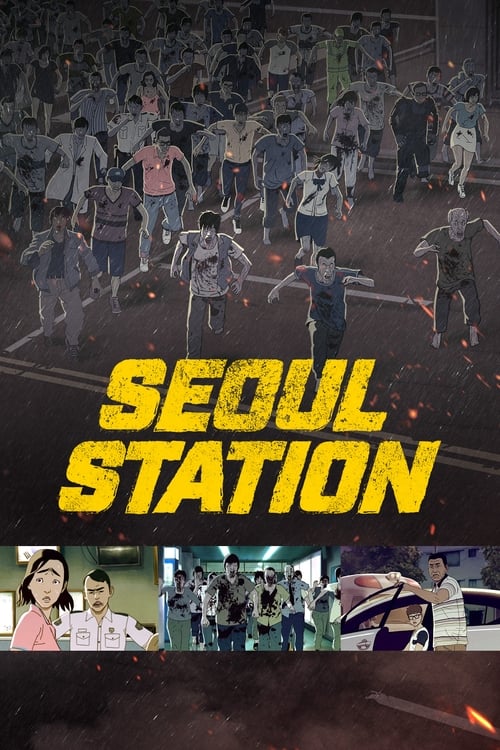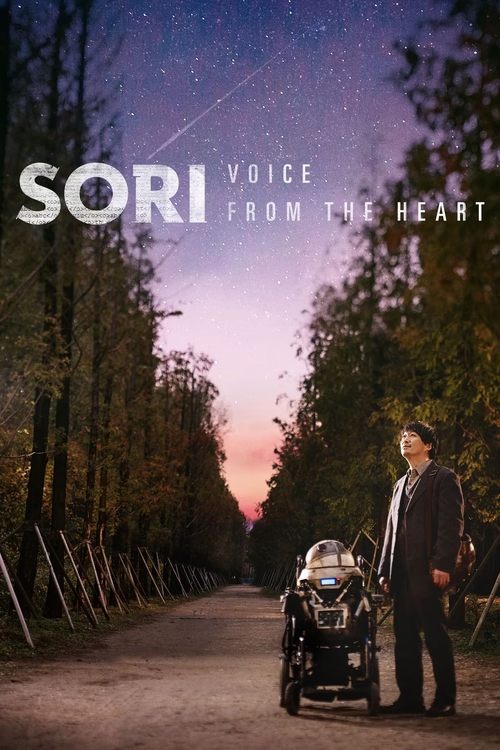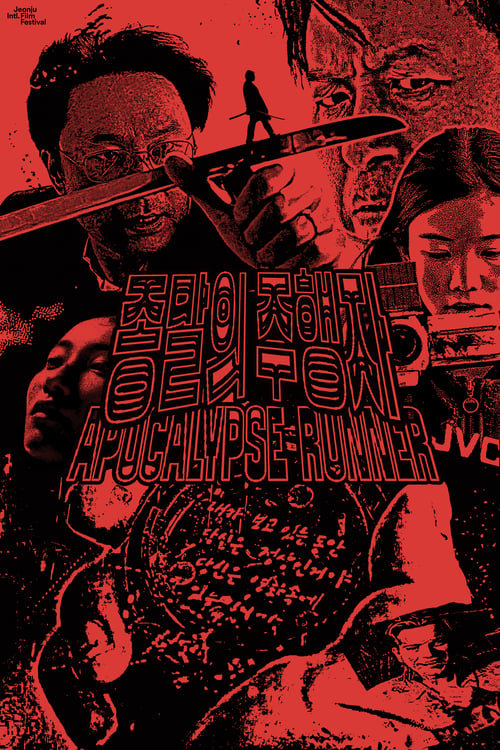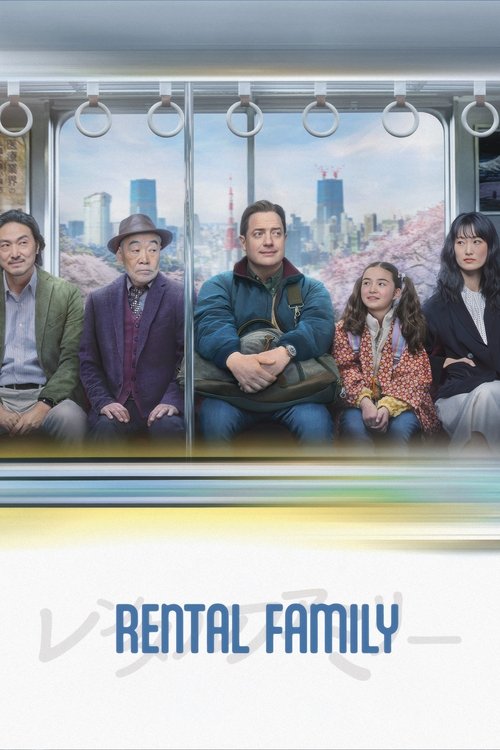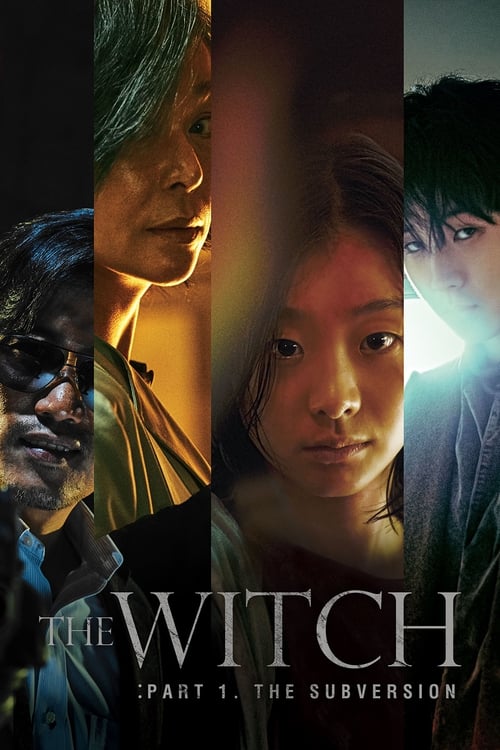
Ask Your Own Question
What is the plot?
The story of Seoul Station opens on a bleak, rainy night in the chaotic heart of Seoul, South Korea. The camera follows a disheveled elderly homeless man, his neck grotesquely bleeding, as he stumbles through the crowded streets near Seoul Station. His movements are slow and pained; his lips mumble incoherent sounds, but no one pays him any attention. The city's indifferent passersby and authorities treat him as invisible, a mere nuisance in their bustling world. The man collapses on the ground inside the station, his life ebbing away unnoticed.
Nearby, another homeless man, younger and more alert, sits close by. He calls the old man "Bro," suggesting a bond--whether familial or brotherly is unclear--but his concern is genuine. When he sees the blood, he urgently tries to get help from the transit police. "He's hurt! He needs help!" he pleads, but the officers dismiss him with disdain, harassing him instead of offering aid. The young man returns to find the old man gone, only to discover him moments later transformed into a ravenous zombie. The old man lunges at him, biting and killing him in a brutal, desperate moment that marks the outbreak's first violent spread.
Parallel to this grim scene, the film introduces Hye-sun, a young woman living in a small, cramped apartment with her boyfriend, Ki-woong. The atmosphere is tense; Hye-sun's face is etched with anxiety and anger. Ki-woong coldly reveals his plan to pimp her out again to solve their financial problems. "You promised me we were done with that!" she shouts, her voice cracking with betrayal. Their argument escalates, and Hye-sun storms out into the rain-soaked streets, desperate to escape her past and Ki-woong's control.
Meanwhile, Suk-gyu, an older man burdened by guilt and regret, arrives in Seoul. He is searching for Hye-sun, his estranged daughter who ran away long ago. His only lead is an online ad posted by Ki-woong, which confirms Hye-sun's location. Driven by a mix of hope and desperation, Suk-gyu navigates the city's underbelly, unaware of the horror about to engulf them all.
As the infection spreads, Seoul Station becomes a battleground. The old man, now fully transformed into a zombie, is the patient zero of this outbreak. The infection initially ravages the homeless population, the city's most neglected and invisible citizens. The authorities respond not with compassion but with suspicion and violence, treating the outbreak as a civil insurrection rather than a biological crisis. Riot police set up barricades, and martial law is declared, but their efforts only escalate the chaos.
Hye-sun calls Ki-woong, telling him she is heading to the hospital and asks him to meet her there. The old man, panicked and confused, tries to take control of the vehicle transporting them, sensing the danger of the hospital where many bite victims have already arrived. His erratic attempt to seize the wheel causes a crash, forcing Hye-sun and the old man to flee into the dark, claustrophobic subway tunnels beneath the city. The tunnels, symbolic of society's forgotten and hidden underclass, become their grim refuge as the undead close in.
Simultaneously, Suk-gyu and Ki-woong make their way toward the hospital, but find it already overrun by zombies. They narrowly escape the carnage, their search for Hye-sun growing more desperate amidst the growing chaos. They attempt to persuade the police to let them pass through the quarantine zone, but their pleas are ignored. The government's denial of the outbreak's true nature becomes painfully clear as they label the crisis an insurrection and begin indiscriminately targeting survivors.
Back at the apartment, Suk-gyu and Ki-woong discover the landlady has turned into a zombie, a chilling sign of how deeply the infection has penetrated everyday life. The apartment, once a place of fragile normalcy, now symbolizes the collapse of safety and order.
The old man, filled with a tragic awareness of his role in the outbreak, makes a desperate attempt to warn the authorities. He tries to climb over the police barricade to alert government officials about the zombies, but his efforts are met with gunfire. The military opens fire, killing him instantly. This moment underscores the brutal indifference of those in power toward the vulnerable.
As the infected breach the barricades, chaos erupts. Hye-sun manages to escape but is scratched on her foot by a zombie, a wound that foreshadows her impending fate. The survivors, including Hye-sun, Ki-woong, and Suk-gyu, are forced into a police station for refuge. The station, however, is soon overrun. Inside a jail cell, a police officer is bitten and turns into a zombie, threatening the trapped survivors with death.
The tension escalates as Suk-gyu finally finds Hye-sun. Their reunion, however, is far from the hopeful moment he imagined. The years of estrangement and pain surface in a bitter confrontation. Suk-gyu reveals to Hye-sun that he is her father, a fact Ki-woong had suspected but that weighs heavily on all three. Their fractured family dynamic is laid bare amidst the apocalypse, a microcosm of the societal breakdown around them.
In a devastating twist, Suk-gyu is bitten during the chaos. As the infection takes hold, he transforms into one of the undead. Instead of a tender reconciliation, his zombified self unleashes a horrifying rage. He attacks Hye-sun brutally, tearing into her as she screams for help. The camera lingers on her desperate cries, the horror of being attacked by her own father amplifying the film's themes of despair and societal collapse. There is no rescue, no salvation--only the relentless spread of death and destruction.
Ki-woong's fate remains uncertain. He survives the initial outbreak and is last seen attempting to escape the quarantine zone, but the film leaves his ultimate survival ambiguous, underscoring the pervasive uncertainty and hopelessness.
The film closes with the image of Hye-sun being attacked by her infected father, the chaos of the outbreak continuing unabated. The authorities remain indifferent, their failure to protect the vulnerable starkly evident. The survivors are left to face the horrors alone, trapped in a city where society's neglect has unleashed a nightmare.
Seoul Station ends on a bleak note, its narrative a searing social critique. The zombie outbreak is not just a horror story but a metaphor for the systemic neglect of the homeless and marginalized. Suk-gyu's transformation and attack on Hye-sun symbolize the destructive fractures within families and society itself. The film's unflinching portrayal of death, despair, and societal failure leaves the viewer with a haunting message: in a world that abandons its most vulnerable, the true monster is the society that allows such neglect to fester.
More Movies Like This
Browse All Movies →What is the ending?
In the ending of "Seoul Station," the main characters face dire consequences as the zombie outbreak escalates. Hae-sook, who has been searching for her daughter, is ultimately bitten and succumbs to the infection. Her daughter, Ji-soo, is left to fend for herself amidst the chaos. The film concludes with a bleak portrayal of survival, as Ji-soo witnesses the collapse of society around her.
As the film approaches its climax, the tension escalates dramatically. Hae-sook, desperate to find her daughter Ji-soo, navigates the chaotic streets of Seoul, now overrun by zombies. The once-bustling city is transformed into a nightmarish landscape, filled with the sounds of chaos and the sight of the undead roaming freely. Hae-sook's determination is palpable; she is driven by a fierce maternal instinct, her heart heavy with worry for Ji-soo's safety.
Meanwhile, Ji-soo, who has been trying to survive on her own, encounters a group of survivors. They are wary and distrustful, reflecting the breakdown of social order in the face of the apocalypse. Ji-soo's vulnerability is evident as she struggles to maintain her composure, her eyes filled with fear and determination. She longs for her mother, and the emotional weight of their separation hangs heavily over her.
As the outbreak worsens, Hae-sook finally reunites with Ji-soo, but their joy is short-lived. In a tragic turn of events, Hae-sook is bitten by a zombie while trying to protect her daughter. The horror of the situation sinks in as Hae-sook realizes her fate. She tries to reassure Ji-soo, urging her to escape and survive without her. The emotional turmoil is intense; Hae-sook's love for her daughter is evident, but she is also faced with the grim reality of her impending transformation into a zombie.
In a heart-wrenching farewell, Hae-sook tells Ji-soo to run, to live, and to not look back. Ji-soo, torn between her love for her mother and the instinct to survive, is forced to leave Hae-sook behind. The scene is filled with raw emotion, capturing the essence of a mother's sacrifice and a daughter's heartbreak.
As Ji-soo escapes into the night, the city around her continues to crumble. The once vibrant streets are now filled with the sounds of chaos, screams, and the relentless moans of the undead. Ji-soo's journey becomes one of survival, but it is also marked by loss and despair. She witnesses the collapse of society, the breakdown of human connections, and the stark reality of a world overrun by the undead.
The film concludes with a haunting image of Ji-soo standing alone amidst the ruins of Seoul, a symbol of resilience but also of profound loss. The fate of Hae-sook is sealed as she succumbs to the infection, becoming one of the many zombies that now roam the streets. The film leaves viewers with a sense of hopelessness, reflecting on the fragility of life and the devastating impact of the outbreak on human relationships.
In the end, Ji-soo is left to navigate a world that has changed irrevocably, carrying the weight of her mother's sacrifice and the harsh reality of survival in a post-apocalyptic landscape. The emotional stakes are high, and the film closes on a somber note, emphasizing the personal tragedies that unfold amidst the chaos of a larger catastrophe.
Is there a post-credit scene?
In the movie "Seoul Station," there is no post-credit scene. The film concludes with a poignant and unsettling ending that leaves viewers with a sense of dread and reflection on the events that transpired. The narrative wraps up as the characters face the consequences of the zombie outbreak, emphasizing the themes of survival and the human condition in the face of catastrophe. The absence of a post-credit scene reinforces the film's dark tone and the unresolved nature of the characters' fates.
What happens to the character Hae-sook throughout the film?
Hae-sook is a homeless woman who becomes one of the first victims of the zombie outbreak. As the story unfolds, she struggles to survive in the chaotic environment of Seoul Station, showcasing her desperation and fear. Her journey highlights the vulnerability of those living on the fringes of society.
How does the character Ki-woong's relationship with his girlfriend evolve during the film?
Ki-woong's relationship with his girlfriend, who is also Hae-sook's daughter, is strained from the beginning. As the outbreak escalates, his selfishness and inability to prioritize her safety lead to tension. His emotional state shifts from indifference to panic as he realizes the gravity of the situation and the danger she faces.
What role does the character Dong-soo play in the story?
Dong-soo is a pivotal character who initially appears to be a protector. He is deeply in love with Hae-sook's daughter and is determined to find her amidst the chaos. His character embodies hope and determination, but as the situation deteriorates, he faces moral dilemmas that challenge his resolve.
How does the zombie outbreak begin in Seoul Station?
The outbreak begins when a homeless man is bitten by an infected individual, leading to a rapid spread of the virus among the homeless population. This initial incident sets off a chain reaction, causing panic and chaos as the zombies begin to attack anyone in their vicinity.
What is the significance of the setting in Seoul Station for the characters?
Seoul Station serves as a microcosm of society, highlighting the struggles of the homeless and marginalized individuals. The setting amplifies the characters' feelings of isolation and desperation, as they navigate both the physical dangers of the zombie outbreak and the emotional turmoil of their personal lives.
Is this family friendly?
"Seoul Station," produced in 2016, is an animated horror film that contains several elements that may not be suitable for children or sensitive viewers. Here are some potentially objectionable or upsetting aspects:
-
Graphic Violence: The film features intense scenes of violence, including zombie attacks and the aftermath of brutal confrontations, which may be disturbing to younger audiences.
-
Blood and Gore: There are numerous depictions of bloodshed and gore, particularly during zombie encounters, which can be unsettling.
-
Themes of Despair and Isolation: The narrative explores heavy themes such as societal neglect, homelessness, and the struggles of marginalized individuals, which may evoke strong emotional responses.
-
Death and Loss: Characters face life-threatening situations, and there are moments of significant loss that can be emotionally impactful.
-
Adult Language and Situations: The dialogue includes strong language and references to adult situations, which may not be appropriate for younger viewers.
-
Psychological Horror: The film employs elements of psychological horror that can create a tense and frightening atmosphere, potentially causing anxiety or fear.
Overall, "Seoul Station" is not considered family-friendly due to its mature themes and graphic content.

